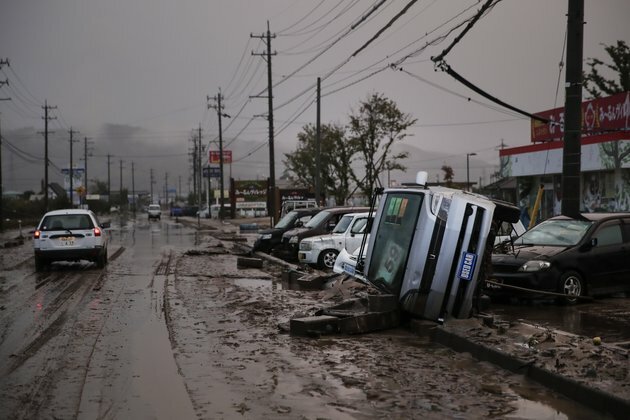Why Fewer Typhoons Are Reaching Normally Hard-Hit Parts of Asia
Voice of America
28 Oct 2019, 17:35 GMT+10

TAIPEI, TAIWAN - In Taiwan, a tropical storm killed two people in August and a low-strength typhoon brushed the northeast coast just over a month later. Normally the western Pacific island gets hit head on by three to four typhoons ever year from June through October. Typhoons, which pack higher winds than other tropical storms, often kill five to 10 people per event and destroy infrastructure.
But for the past three years Taiwan and the Philippines, an archipelago to its south, have missed their historical average typhoon counts because of high water temperatures over the mid-Pacific where typhoons originate and shifts in upper-atmosphere winds, meteorologists believe.
The Philippines can get up to 20 of the raging storms per year. The systems called cyclones and hurricanes in other parts of the world bring winds strong enough to blow down trees and rainfall that can quickly turn streets into rivers. They typically prompt mass evacuations and shut down transportation including flights.
Embed Copy Listen Jason Nicholls, senior meteorologist with American forecasting service AccuWeather Jason Nicholls, senior meteorologist with American forecasting service AccuWeather audio player.
"General bias is in the Indian Ocean and in the Pacific has been for waters to be warmer than normal and global warming may have something to do with that," according to Jason Nicholls, senior meteorologist with American forecasting service AccuWeather.
Warmer waters
Ocean temperatures in the central and eastern Pacific Ocean have heated up since 2017, causing typhoons to form relatively far from Taiwan and the Philippines that lie to the west, Nicholls said.
Upper-level steering winds ultimately push the storms north, eventually affecting Japan, South Korea and eastern China, he said. "They have more time to get picked up and curved off to the north and northeast," Nicholls said.
Western Pacific waters are relatively cool this year, he said, meaning fewer storms form near the east coasts of Taiwan or the Philippines.
Warm waters remain around the equator near the international dateline, he said. In the 1980s and 1990s waters around the Pacific and Indian oceans were cooler "as a general rule."
Asia's deadliest storms each year, including the 2013 super-typhoon that killed 6,340, often reach the Philippines, a largely impoverished country that has struggled historically to cope. No full-blown typhoons, only weaker tropical storms, have made landfall there to date this year.
Heading north
Most of the 21 typhoons in Asia this year so far reached Japan, South Korea and China because of the northbound trend. The most severe, Typhoon Hagibis, killed 80 people in eastern Japan earlier this month.
"If in a situation where Pacific Ocean high pressure is weak and higher north, before reaching Taiwan typhoons will follow the high pressure northward and reach Japan," said Chen Meng-shih, long-range forecast section chief with Taiwan's Central Weather Bureau.
Embed Copy Listen Chen Meng-shih, long-range forecast section chief with Taiwan's Central Weather Bureau Chen Meng-shih, long-range forecast section chief with Taiwan's Central Weather Bureau audio player.
Warming ocean temperatures will "drive cyclonic storm activity," the advocacy group Union of Concerned Scientists said in a December 2018 report. Other scientific reports say ocean temperatures will make the storms stronger.
Ocean temperatures are going up because the water absorbs heat from "increased concentrations of greenhouse gases in the atmosphere", mainly from fossil fuel consumption, the civic group International Union for Conservation of Nature says.
Too wet or not wet enough?
Lack of typhoons has spared crops, infrastructure and human lives. Typhoon Mitag, Taiwan's biggest storm of 2019, caused just $60,485 in crop damage, the government's Council of Agriculture found. Mitag passed east of the island on October 1.
In a more typical case, Typhoon Soudelor killed six people, cancelled 300 flights and cost farmers $9.42 million in Taiwan.
In the Philippines, dry weather has accelerated municipal-level infrastructure projects that heavy rainfall could otherwise delay, said Jonathan Ravelas, chief market strategist with Banco de Oro UniBank in metro Manila. The government is in the midst of a 5-year, $169 billion infrastructure renewal drive to attract investment.
Embed Copy Listen Jonathan Ravelas, chief market strategist with Banco de Oro UniBank in metro Manila Jonathan Ravelas, chief market strategist with Banco de Oro UniBank in metro Manila audio player.
But the dearth of typhoons has cut valuable rainfall too, Ravelas said. Parts of Metro Manila have rationed water this year partly for lack of precipitation.
"You'd rather have more rains but on the other side you have lots of calamities," he said. "It's a double-edged sword, so to speak."
 Share
Share
 Tweet
Tweet
 Share
Share
 Flip
Flip
 Email
Email
Watch latest videos
Subscribe and Follow
Get a daily dose of North Korea Times news through our daily email, its complimentary and keeps you fully up to date with world and business news as well.
News RELEASES
Publish news of your business, community or sports group, personnel appointments, major event and more by submitting a news release to North Korea Times.
More InformationInternational
SectionMoscow removes Taliban from banned list, grants official status
MOSCOW, Russia: This week, Russia became the first country to officially recognize the Taliban as the government of Afghanistan since...
Netanyahu vows 'No Hamas' in postwar Gaza amid peace talks
CAIRO, Egypt: This week, both Hamas and Israel shared their views ahead of expected peace talks about a new U.S.-backed ceasefire plan....
US sends message by publicizing visa ban on UK punk-rap band
WASHINGTON, D.C.: The Trump administration has made public a visa decision that would usually be kept private. It did this to send...
Tragedy in Spain: Diogo Jota and his brother die in car accident
MADRID, Spain: Liverpool footballer Diogo Jota and his younger brother, André Silva, have died in a car accident in Spain. Spanish...
Early heatwave grips Europe, leaving 8 dead and nations on alert
LONDON, U.K.: An unrelenting heatwave sweeping across Europe has pushed early summer temperatures to historic highs, triggering deadly...
U.S. military, China, Russia in Space race
President Donald Trump's plans to build a space-based Golden Dome missile defense shield have drawn immediate criticism from China,...
Business
SectionUS debt limit raised, but spending bill fuels fiscal concerns
NEW YORK CITY, New York: With just weeks to spare before a potential government default, U.S. lawmakers passed a sweeping tax and spending...
Shein hit with 40 million euro fine in France over deceptive discounts
PARIS, France: Fast-fashion giant Shein has been fined 40 million euros by France's antitrust authority over deceptive discount practices...
Meta hires SSI CEO Gross as AI race intensifies among tech giants
PALO ALTO/TEL AVIV: The battle for top AI talent has claimed another high-profile casualty—this time at Safe Superintelligence (SSI),...
Engine defect prompts Nissan to recall over 443,000 vehicles
FRANKLIN, Tennessee: Hundreds of thousands of Nissan and Infiniti vehicles are being recalled across the United States due to a potential...
Microsoft trims jobs to manage soaring AI infrastructure costs
REDMOND, Washington: Microsoft is the latest tech giant to announce significant job cuts, as the financial strain of building next-generation...
Stocks worldwide struggle to make ground Friday with Wall Street closed
LONDON UK - U.S. stock markets were closed on Friday for Independence Day. Global Forex Markets Wrap Up Friday with Greeback Comeback...













